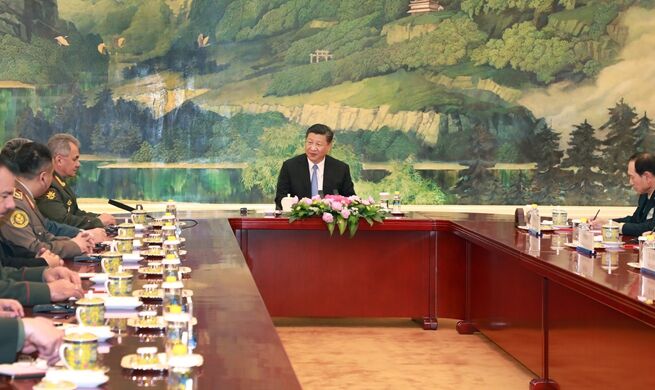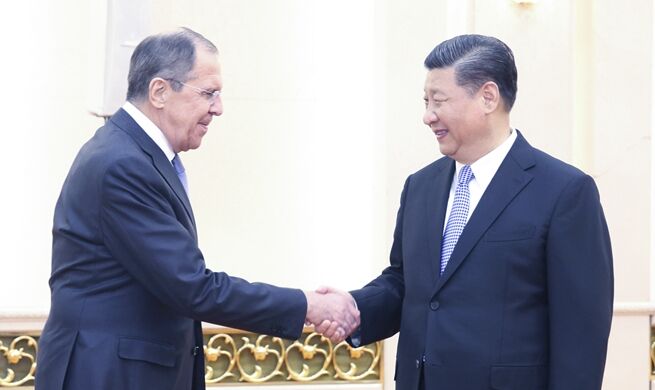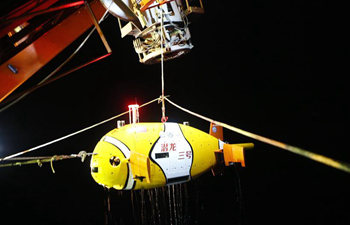WASHINGTON, April 23 (Xinhua) -- The United States on Monday released both optimistic and tough messages concerning the prospect of the Korean Peninsula's denuclearization, as the meeting between South Korean President Moon Jae-in and top leader of the Democratic People's Republic of Korea (DPRK) Kim Jong Un approaches.
"A LOT OF REASONS FOR OPTIMISM"
U.S. Defense Secretary James Mattis said on Monday that he was optimistic that the dialogue with the DPRK will be "fruitful."
"Right now, I think there is a lot of reasons for optimism that the negotiations will be fruitful and we'll see," Mattis said.
The statement came after Pyongyang announced on Friday to halt its nuclear and intercontinental ballistic missile (ICBM) tests, and to close up a nuke test site to ensure the transparency of its test-halting effort.
When asked about the reason to be optimistic about the Peninsula denuclearization, White House spokesperson Sarah Sanders also said on a press briefing that "we've seen some steps in the right direction."
"We also have seen a major change in what has taken place in the past," she added.
"MAXIMUM PRESSURE CAMPAIGN IS GOING TO CONTINUE"
Mixed messages were released recently on the U.S. side, as Washington tried to convey a tough message to pressure Pyongyang.
Sanders said on Monday that the U.S. goal is denuclearization of the Peninsula, "and we're going to continue the maximum pressure campaign that has been ongoing to" the DPRK until "we see concrete actions taken towards complete and total denuclearization."
She added that "certainly no sanctions lifted until we see concrete actions" taken by the DPRK to denuclearize.
For his part, U.S. President Donald Trump has seemed to turn more cautious, as he tweeted on Sunday that "we are a long way from conclusion on North Korea (the DPRK), maybe things will work out, and maybe they won't. Only time will tell."
Also on Sunday, speaking on condition of anonymity, a senior U.S. administration official told the media following the first day of the G7 foreign ministers' meeting in Toronto that "We are looking for substantial dismantlement" of the DPRK's nuclear programs first.
The official further explained that the U.S. side is currently using two avenues: "one, a global campaign of maximum pressure; and two, talks ... in the past, people have relaxed pressure to improve the atmospherics for talks. We are not going to repeat that mistake again."
Speaking of the DPRK's medium-range missiles, a concern for Japan, the official said that Pyongyang's ICBM programs "always accompany a military nuclear program."
"They're inseparable. So ... we are very concerned, obviously, about the nuclear and the ICBM program because they are necessarily linked," he added, hinting that Trump would discuss the issue with Kim in their meeting.
DIPLOMACY OVERRIDES
Positive momentum around the Korean Peninsula has been built up in recent months, thanks to the inter-Korean good faith unfold with the diplomacy around the PyeongChang Winter Olympics and Peninsula denuclearization, and efforts of relative countries to promote dialogue between the DPRK and South Korea, and with the United States.
Troy Stangarone, senior director at the Korea Economic Institute, a Washington-based non-profit policy research institution, told Xinhua that enormous credit should go to relative countries like China "for creating the environment needed for the upcoming inter-Korean summit."
Without these continuous efforts to push for dialogue with the DPRK, the world "might not be where we are today," he added, explaining that the participation of Pyongyang in the PyeongChang Olympics helped "shift the narrative of confrontation on the Korean Peninsula to one of dialogue."

















